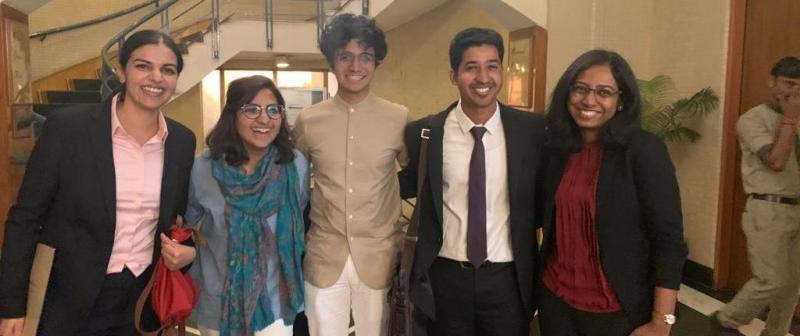
GNLU Gandhinagar final year student Hatim Hussain appears to be the only law student to have won the prestigious Rhodes Scholarship this year to study a fully-funded postgraduate degree at Oxford University, having been selected with several others (pictured above).
He is the second student from GNLU to win the honour, following Sameer Rashid Bhat in 2017, whose selection “was an important consideration for me in motivating me to apply for scholarships abroad and thinking about pursuing higher studies”, Hussain said.
“Coming from a background where we had very limited financial circumstances, I would never have been able to pursue [further education abroad],” he noted.
Hussain, who is currently interning with Supreme Court Justice DY Chandrachud, said his current plan was mostly to move into academia proper, after the Rhodes, and to “also be involved in policy initiatives, along with advocating for the rights of marginalised communities”.
“My interests have been very versatile,” he explained about his preferred topics of study. “I am interested to pursue subjects relating to law, finance and technology, and accordingly do a DPhil later.”
Hussain said he wanted to research “how regulatory models can be evolved to deal with poverty and inequality”.
It is a subject close to his heart, he said, due to his own circumstances of coming from a family of limited financial means.
He was able to study at GNLU by winning two previous scholarships - the overseas-based Shukre Illahi Global Scholar (from 2015 to 2020), and the university’s own GNLU Scholarship for Research Assistance (from 2016 to 17).
“Those were particularly helpful but those were not enough,” Hussain said, noting that the funding only covered tuition fees. “I was also working part time - I used to work as a freelance writer for a number of websites, and accordingly gather some funds to support my studies.”
Besides the obviously competitive Rhodes scholarship process, there were not enough scholarships available to undergraduates in India, he said. “I think it’s very competitive but the competition arises because of the fact that there are not enough funding opportunities for educational studies, particularly if you compare it to other jurisdictions for students who come from such [non-traditional or underprivileged] backgrounds.”
Commenting on the news yesterday that the Common Law Admission Test (CLAT) committee had vowed to increase scholarships offered, he said it was important for institutions to aid “students who may not be able to support their studies”.
This was a particular issue also in his own Muslim community, where “three out of four students do not end up getting a higher education” in India, he said. “A support system is I think very essential, along with other efforts, such as developing awareness. For instance I am involved in supporting legal education for Muslim students in the state of Gujarat.”
Publications record to already rival many profs...
In any case, Hussain’s academic output himself over the past few years has been prolific.
He is currently working with Cambridge University’s Cambridge Center for Alternative Finance (CCAF), since April 2018, working on financial regulation modelling and cryptocurrency and blockchain.
And since July of 2019, until next year, he is also working as an academic assistant on cross-regional studies at the Academy of Internet Finance of Zhejiang University in Hangzhou, China.
Regarding GNLU, he said that the university had been “immensely helpful in nurturing talent in diverse backgrounds and I am grateful to the professors for supporting me throughout”.
His publications (which we grabbed from a copy of his CV he has shared) include:
- University of Cambridge, The Global RegTech Industry Benchmark Report (Aug, 2019) link.
- University of Cambridge, The Global Cryptoasset Regulatory Landscape Study (Apr, 2019) link.
- NUJS Law Review, Reinventing Regulation: The Curious Case of Taxation of Cryptocurrencies in India’, Vol 10:4 (Dec, 2017). Awarded ‘Gujarat National Law University Overall Best Research Paper Award’, 2017-18 link.
- Oxford Business Law Blog, Regulatory Technology: Introducing Evidence Based Classifications of RegTech Firms link.
- Oxford Business Law Blog, A Legal and Regulatory Framework for Governance of Cryptoassets (Jul, 2019) link.
Rhodes continues falling out of love with lawyers?
Continuing the apparent trend of selecting fewer and fewer lawyers, only one lawyer was selected again this year,
Last year the ‘law’ Rhodes went to NUJS’ Mihika Poddar, but for a long time at least two if not more law students from India had been selected.
threads most popular
thread most upvoted
comment newest
first oldest
first
NLSIU: 6
NALSAR: 4
NUJS: 3
GNLU: 2
So NLSIU is still top, but not unassailable. If we look at the next decade (2020 to 2030) the gap may get even narrower.
It's not easy to distill arcane academic concepts into something that non-specialists can read and understand, so let's not diss newspaper articles, please?
So kindly stop judging!
2015: 1 NLSIU, 1 NALSAR
2016: 1 NLSIU, 1 NUJS, 1 NUALS
2017: 1 GNLU
2018: 1 NUJS
2019: 1 GNLU
Ranking:
1. NLSIU, NUJS and GNLU, joint (2)
2. NALSAR and NUALS, joint (1)
Rhodes scholar breakup in last 10 years:
2010: 1 NLSIU, 1 NALSAR
2011: 1 NLSIU
2012: 1 NLSIU, 1 NALSAR
2013: 1 NLSIU, 1 NUJS
2014: 1 NLSIU, 1 NALSAR
2015 to 2019: See above
Ranking for 10 years:
1. NLSIU (5 + 2= 7)
2. NALSAR (3 +1 =4)
3. NUJS (2 + 1 = 3)
4. GNLU (0 + 2 = 2)
5. NUALS (0 +1 =1)
Still, prolific writer...? This is just insulting to other law students and professors - the publications are by no metric prolific (genuinely not trying to downplay Haatim or GNLU's achievements, just chiding LI).
Not taking anything away from GNLU, but let's be calm and do a holistic assessment of scholarship/fellowship awards before declaring which law school is the best. I am happy to be proven wrong. Others can share data from their law schools.
threads most popular
thread most upvoted
comment newest
first oldest
first